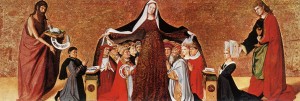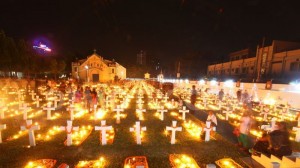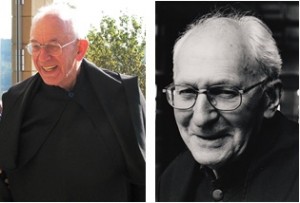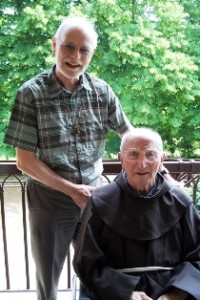Each year, in November, we remember all the saints, and all who have died, on the feasts of All Saints and All Souls, November 1st and 2nd. These feast days seem to link, most appropriately, with what is put before us by the Church at the end of November, in the 33rd Week of the Year, followed by the feast of Christ the King, and then the first two weeks of Advent: the Second coming of Jesus and the End of the World. This year, it struck home to me, that the teaching of the Second Coming, and the two feasts, can easily be linked.
Mary with so many entering heaven under her mantle.
The Saints are all dead! Nobody declares a person ‘a Saint’, officially, until after they have died, and usually, it is at least five years after death, before the Church considers them for canonization. For those who are left behind, once somebody they love has died, it can feel like ‘the end of the world’, i.e. feelings of sufferings, loss, fear, sadness and difficulty. But this is not the only way to look at such sad times, as the scriptures explain.
All Souls Day celebrated in Dhaka
This is how the second coming of Jesus was described last Sunday in the first reading:
“There is going to be a time of great distress, unparalleled since nations first came into existence. ….Your own people will be spared, all those whose names are found written in the Book. Of those who lie sleeping in the dust of the earth, many will awake, some to everlasting life, some to shame and everlasting disgrace. The learned will shine as brightly as the vault of heaven, and those who instructed many in virtue, as bright as stars for all eternity.” (Daniel 12; 1-3)
The Gospel from St. Mark puts it like this:
Jesus said to his disciples: ‘In those days, after the time of distress, the sun will be darkened, the moon will lose its brightness, the stars will come falling from heaven and the powers of the world will be shaken. And then they will see the son of Man coming in the clouds with great power and glory; then too he will send the angels to gather his chosen from the four winds, from the ends of the world to the ends of heaven. Take the fig tree as a parable: as soon as its twigs grow supple and its leaves come out, you know that summer is near….’ …Heaven and earth will pass away, by my words will not pass away” (Mark 13: 24-32)
Many people, after losing somebody who was very close to them – somebody they loved, greatly, feel an awful sense of emptiness; suddenly, all seems to have come to an end, and the future is bleak. Yet I have seen, among our Christian parishioners who are bereaved – not optimism, or joy, because of the loss that has happened – but something else. That something is the ability to live through the very great sadness they feel with dignity, and it is inspired by the virtue of hope. It is inspirational.
When somebody close to us dies, it is also a moment of God, of the Second Coming of Jesus. Our own personal death will be the same. In fact, in Leyland, the Second Coming should be very prominent in our minds, because of our World Famous Ceramic at the front of the Church, under which we walk to enter: “He is seated at the right hand of God the father almighty, and he will come to judge the living and the dead”. During Mass we hear these words after the Our Father: “By the help of your mercy may we be always free from sin, and safe from all distress as we await the blessed hope and the coming of our Saviour Jesus Christ”.
The Second Coming is not just about things negative, although the first part of both the prophet Daniel, and the Gospel of Mark, of last week’s Sunday liturgy, are rather frightening. There are other phrases in both readings, above underlined and in italics, that have a gentle peace about them: “Take the fig tree as a parable: as soon as its twigs grow supple and its leaves come out, you know that summer is near:” (Mark 13: 28) – tender, supple life, gentle and fresh like new leaves in spring. Human existence often oscillates between fear and hope, even in those who are believers. Peter, one wind-swept day, walked on the stormy waters of Lake Galilee to meet Jesus, and as he did so, he became afraid and began to sink. Then, he felt the strength of that hand in his, pulling him out of the water “O man of little faith, why did you doubt?” (Mt. 14: 31). We could ask each of our readers of the blog, today, who are believers: “Why do I doubt? Why do I continue to be so fearful?” In fact, there are so many who are left behind, and who are that inspiration of hope, in our own town of Leyland.
Among many reasons why negative doubts, fear and unhappiness, dominate the gift of divine hope, there is one deep-rooted one. Because of contamination with worldly attitudes, a person can spiral down, to deep fears and anxieties, that are not what God wants for us; in fact, they oppose the knowledge, that faith and hope give us, of his personal love for each and every one of us.
I can be afraid of losing what I have, and this may happen when I am strongly attached, in a worldly way, to my temporal way of life; it may be my incessant activity; it may be worldly possessions, a standard of living, a relationship, each a good in itself. Sometimes people who are truly afraid within, can put on a brave show by smiling, telling jokes, being the centre of attention, but inside they are a ‘cauldron’ of uncontrollable emotions, especially the fear of losing everything they hold dear. People, sadly, sometimes take their own lives because they feel they have lost everything; life is not worth living for them, as they feel they have lost all they possessed, and this to the detriment of those they love, their family and of God.
There is yet another factor, among the many, that can cause despair and sadness. If, as I grow older and I reach the ‘grand old age’ of 60 – for myself, I am already well past that ‘young’ age – I want to have the same looks, the same energy as a 20 year old, it could lead to problems. How would I cope with serious illness, or loss of a job, say, with that attitude? If I do not try to love God, with all my heart, mind, soul and strength, situations overwhelm me. It could feel like the sun, the moon and the stars have fallen in, if I lost my health, or my job, depending on how attached I was, to all that God has given me.
In all of this, I think, there is a real need to thank God for people who are as bright and shining, as those described in the book of Daniel: “the learned will shine as brightly as the vault of heaven, and those who have instructed many in virtue, as bright as stars for all eternity”. This is a very positive phrase and points us to good role models. If we could only aspire to this ideal, then this mode of thought would lead us to understand that the cold bleakness of winter will pass, as we see new shoots growing – strong, bringing new life.
It is almost a truism to say people of hope will always be there: the just, the holy ones, the blessed who have before their eyes, the image of the first shoots of spring, and in their hearts, the wonderful gift of peace. These are the ones who can be our example here, and now, and they lead us to God. Some of those who have died in this past year may also fit in to this category, because of their outlook when they were alive among us; perhaps, all of them are, in their own way, for those who knew and loved them well. I have a very high regard for two monks, who died this past year, and for a Franciscan friar, each one a role model, for me, in a different way. They are Fr. Benedict Web (my housemaster at Ampleforth), Fr. Edmund Hatton, (my predecessor as Parish Priest of Brownedge) and Fr. Andrea Balbo OFM (the first co-ordinator of those who found the charism of unity a great help in Religious Life, through the Focolare Movement).
Fr. Benedict Web OSB and Fr. Edmund Hatton OSB
Fr Andrea Balbo OFM with Fr. Theo Jansen OFMcap.
Yes, a Christian knows that one day Jesus will come again, the sun will be darkened, the moon will lose its brightness, the stars will come falling from heaven and the powers of the world will be shaken. The world will come to an end; it is a fearful prospect, as is the experience of death. All is held in the loving plan of God, for the whole of Creation. Heaven and earth will pass away but my words will not pass away. The light of hope in God’s love shines for ever.
To view the blog in its original formatting please visit the main blog site: www.stmarysblog.co.uk/
Father Jonathan




